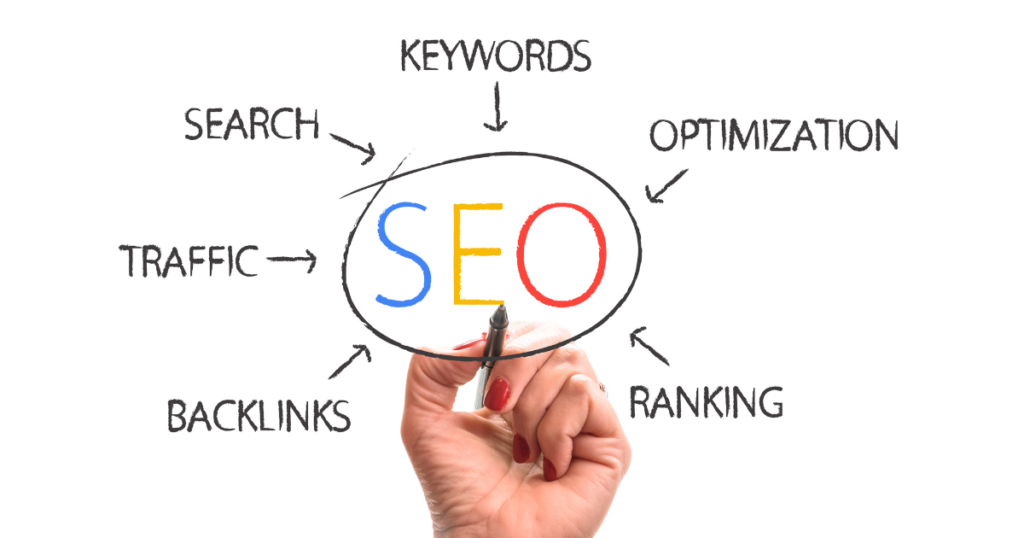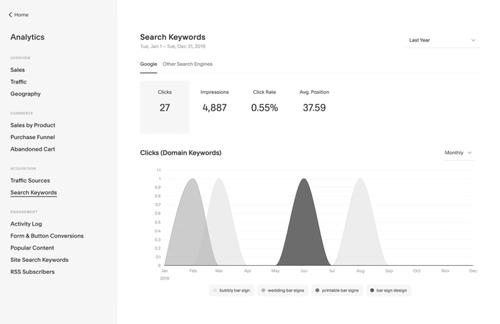When building a website, you want to ensure it’s optimised for search engines so potential customers can find you. But choosing the right platform for SEO can be overwhelming, especially when faced with popular options like Squarespace and WordPress. If you’re wondering which platform will give you the best shot at climbing up the Google rankings without causing a major headache, you’re in the right place.
SEO isn’t just about incorporating the right keywords; it’s about ensuring your website is structured, optimised, and ready to compete in the crowded digital landscape. In this article, you’ll discover a detailed comparison between Squarespace and WordPress, focusing specifically on their SEO capabilities. By the end, you’ll clearly understand which platform will best suit your SEO needs and help you achieve those high search engine rankings.

Overview of Squarespace and WordPress
Before diving into the specifics of SEO, let’s start with a brief overview of Squarespace and WordPress. Understanding the fundamental differences between these two platforms will provide a solid foundation for evaluating their SEO capabilities.
Squarespace
Squarespace is a website builder known for its sleek, modern templates and user-friendly interface. It’s an all-in-one platform that includes hosting, templates, and a variety of built-in tools, making it particularly appealing for beginners and those who prefer a streamlined experience. Squarespace excels in design flexibility, offering beautiful, professionally designed templates that are easy to customise without needing any coding knowledge.
WordPress
WordPress, on the other hand, is a powerful content management system (CMS) that offers unparalleled flexibility and customisation options. It comes in two versions: WordPress.com (a hosted solution similar to Squarespace) and WordPress.org (a self-hosted solution that provides complete control over your site). For the purpose of this comparison, we’ll focus on WordPress.org, as it offers more extensive SEO capabilities. WordPress is highly favoured by developers and tech-savvy users due to its open-source nature, vast array of plugins, and the ability to modify nearly every aspect of the site.
General Comparison
Usability: Squarespace is often praised for its ease of use, making it a great choice for beginners. Its drag-and-drop editor and intuitive interface allow users to build and manage their sites with minimal effort. WordPress, while also user-friendly, has a steeper learning curve, especially for those new to website development. However, its extensive customisation options provide greater flexibility for those willing to invest the time to learn.
Features: Squarespace offers a comprehensive set of built-in features, including e-commerce capabilities, blogging tools, and various integrations. WordPress, however, stands out for its extensive library of plugins and themes, which allow users to add virtually any functionality imaginable to their site.
Flexibility: When it comes to flexibility, WordPress is the clear winner. Its open-source nature means users can access and modify the code, creating a truly customised website. Squarespace, while flexible within its ecosystem, does not offer the same level of customisation and control as WordPress.
SEO Features in Squarespace
Squarespace is known for its beautiful design and user-friendly interface, but how does it fare when it comes to SEO? Here, we’ll explore the key SEO features offered by Squarespace and evaluate their effectiveness.

Built-in SEO Tools and Features
Squarespace comes with a range of built-in SEO tools that make it easy for users to optimise their sites. These include:
Customisable Page Titles and Meta Descriptions: Squarespace allows you to edit page titles and meta descriptions for each page, which are crucial for search engine rankings and click-through rates.
Clean URLs: The platform automatically generates clean, SEO-friendly URLs that help improve your site’s visibility in search results.
Responsive Design: All Squarespace templates are mobile-friendly, which is a significant factor in SEO as search engines prioritise mobile-first indexing.
Sitemap Generation: Squarespace automatically generates and updates your sitemap, which helps search engines crawl and index your site more efficiently.
SSL Certificates: Every Squarespace site comes with an SSL certificate, ensuring your site is secure. This is a key ranking factor for search engines.
Ease of Use for Beginners
One of Squarespace’s biggest advantages is its ease of use. The platform’s built-in SEO features are designed to be user-friendly, making it simple for beginners to optimise their sites without needing technical expertise. The intuitive interface allows users to make SEO adjustments quickly and easily, which can be particularly beneficial for small business owners and entrepreneurs who may not have the time or resources to delve deeply into SEO.
Limitations and Potential Drawbacks
While Squarespace offers several robust SEO features, it does have some limitations:
Limited Advanced SEO Options: For users looking to implement more advanced SEO strategies, Squarespace’s built-in tools might not be sufficient. Unlike WordPress, Squarespace does not support extensive customisation or third-party plugins, which can restrict your ability to fine-tune your SEO efforts.
Less Control Over Technical SEO: Squarespace’s simplified approach means you have less control over technical SEO aspects, such as site speed optimisation and server-side settings. While these are handled adequately by the platform, more advanced users might find the lack of control frustrating.
Dependence on Squarespace Ecosystem: Being an all-in-one platform, you are limited to the features and tools that Squarespace provides. This can be a drawback if you need specific SEO functionalities that aren’t available within the Squarespace ecosystem.
SEO Features in WordPress
WordPress is renowned for its flexibility and extensive customisation options, but how does it perform in terms of SEO? In this section, we’ll explore the SEO features of WordPress, focusing on its plugins, customisation options, and potential challenges.

SEO Plugins and Customisation Options
One of the biggest strengths of WordPress is its vast array of SEO plugins and the ability to customise every aspect of your site’s SEO. Key plugins include:
Yoast SEO: Yoast is one of the most popular SEO plugins for WordPress, providing a comprehensive suite of tools to optimise your site. It offers features like keyword optimisation, readability analysis, meta tags management, XML sitemaps, and more.
All in One SEO Pack: Another powerful plugin, All in One SEO Pack, offers similar features to Yoast, including XML sitemap support, meta tags, social media integration, and advanced tools for e-commerce sites.
Rank Math: This newer SEO plugin is gaining popularity due to its user-friendly interface and advanced features. Rank Math includes keyword tracking, rich snippets, and in-depth SEO analysis.
With these plugins, WordPress users can implement advanced SEO strategies, customise their SEO settings, and have greater control over their site’s optimisation.
Flexibility and Control Over SEO Settings
WordPress provides unparalleled flexibility and control over SEO settings. Here are some key aspects:
Customisable Permalinks: You can create clean custom URLs and SEO-friendly, which helps improve your site’s visibility in search engines.
Image Optimisation: WordPress allows for various image optimisation plugins that can help reduce image sizes and improve load times, which is crucial for SEO.
Site Speed: Numerous caching and optimisation plugins are available to enhance your site’s speed, a critical factor for SEO.
Schema Markup: WordPress plugins like Schema Pro enable you to add structured data to your site, helping search engines understand your content better and potentially improving your rankings.
Potential Challenges for Beginners
While WordPress offers extensive SEO capabilities, it can be challenging for beginners. Here are some common challenges:
Learning Curve: The flexibility and customisation options in WordPress come with a steeper learning curve compared to platforms like Squarespace. Beginners might find it overwhelming to navigate the various plugins and settings.
Maintenance: Managing a WordPress site requires regular updates to the core software, themes, and plugins. Failing to keep these updated can lead to security vulnerabilities and performance issues.
Initial Setup: Unlike Squarespace, which is an all-in-one solution, WordPress requires users to set up hosting, install the software, and choose a theme. This additional setup can be a barrier for those without technical knowledge.
Real-world Examples
To illustrate the power of WordPress SEO, consider the case of a small business that migrated from Squarespace to WordPress. By leveraging advanced SEO plugins and customisation options, they saw a significant increase in organic traffic and search engine rankings within a few months. This example highlights how WordPress can offer long-term SEO benefits with the right setup and optimisation.
Comparative Analysis
Now that we’ve explored the SEO features of Squarespace and WordPress individually, it’s time to compare them head-to-head. This section will highlight the key SEO features of each platform, their pros and cons, and provide real-world examples to help you make an informed decision.
Key SEO Features: Head-to-Head Comparison
Customisation and Flexibility
Squarespace: Offers a range of built-in SEO tools that are easy to use, making it ideal for beginners. However, the platform’s closed ecosystem limits advanced customisation options.
WordPress: Boasts extensive customisation options through plugins and themes, allowing for deep SEO optimisation. Users can modify almost every aspect of their site’s SEO, but this comes with a steeper learning curve.
Ease of Use
Squarespace: Known for its user-friendly interface and intuitive design, Squarespace makes it easy to manage SEO without technical knowledge. The drag-and-drop editor simplifies the process of creating and optimising content.
WordPress: While powerful, WordPress requires a higher level of technical expertise. Users need to be comfortable installing and managing plugins, themes, and updates.
SEO Tools and Plugins
Squarespace: Includes essential SEO tools such as meta tags, clean URLs, sitemaps, and SSL certificates. However, it lacks the depth and variety of SEO plugins available on WordPress.
WordPress: Offers a vast array of SEO plugins, including Yoast SEO, All in One SEO Pack, and Rank Math. These plugins provide comprehensive SEO features and detailed optimisation options.
Performance and Speed
Squarespace: Ensures good performance and speed through its optimised infrastructure, but users have limited control over server settings and caching.
WordPress: Performance can vary based on hosting and the optimisation practices employed. Plugins like WP Rocket and W3 Total Cache can significantly improve site speed, but they require proper configuration.
Mobile Optimisation
Squarespace: All templates are responsive, ensuring that sites look good and perform well on mobile devices.
WordPress: Responsiveness depends on the theme used. Many modern themes are mobile-friendly, but older themes may require additional adjustments.
Support and Resources
Squarespace: Provides 24/7 customer support and extensive documentation, making it easier for users to get help when needed.
WordPress: Relies on community support, forums, and third-party tutorials. While a wealth of information is available, it can be overwhelming for beginners.
Pros and Cons
Squarespace:
Pros:
- User-friendly interface
- All-in-one platform with hosting and built-in SEO tools
- Beautiful, responsive templates
- Excellent customer support
Cons:
- Limited advanced SEO customisation
- Less control over technical SEO aspects
- Higher costs compared to basic WordPress setups
WordPress:
Pros:
- Extensive customisation and flexibility
- Wide range of SEO plugins
- Full control over technical SEO
- Potentially lower costs with self-hosting
Cons:
- Steeper learning curve
- Requires regular maintenance and updates
- Support primarily through community resources
Cost and Time Investment
Choosing the right platform involves considering not just the features, but also the cost and time investment required for effective SEO. This section will break down the costs and time commitments associated with Squarespace and WordPress, helping you understand what to expect from each platform.
Squarespace Costs:
Subscription Plans: Squarespace offers various tiers, starting at approximately $18 per month for the Personal plan, and up to $54 per month for the Advanced Commerce plan. All plans come with hosting, templates, and basic SEO tools.
Domain Registration: A custom domain is complimentary for the first year with an annual subscription, with renewal fees typically ranging from $23 to $31 per year.
Additional Features: Some features, such as advanced e-commerce tools or email marketing, may entail extra costs.
Time Investment:
Setup Time: Squarespace is user-friendly, enabling you to launch your site quickly, often within a few hours.
SEO Management: Managing SEO on Squarespace is relatively simple. Basic tasks like editing meta tags, adding alt text to images, and ensuring mobile responsiveness can be easily accomplished through the platform’s interface.
Maintenance: Squarespace handles all updatesand maintenance, saving you time to concentrate on content creation and optimisation.
WordPress Costs:
Hosting: WordPress.org is free, but you’ll need to pay for hosting, which can range from AUD 4 to AUD 40 per month, depending on the provider and plan.
Domain Registration: Similar to Squarespace, domain registration typically costs $23 to $31 per year.
Premium Themes and Plugins: While many themes and plugins are free, premium options can range from $31 to $155 or more. Essential SEO plugins like Yoast SEO or All in One SEO Pack often offer free versions, but premium features may require a subscription.
Developer Costs: If you’re not comfortable with technical aspects, you may need to hire a developer. Rates can vary widely but expect to pay anywhere from $78 to $233 per hour for professional assistance.
Time Investment:
Setup Time: Setting up a WordPress site involves more steps compared to Squarespace, including choosing a hosting provider, installing WordPress, selecting a theme, and configuring plugins. This can take several hours to a few days, depending on your experience.
SEO Management: WordPress offers powerful SEO tools, but they require time to learn and use effectively. Regularly updating plugins, managing security, and optimising site speed can be time-consuming.
Maintenance: WordPress requires ongoing maintenance, including updating the core software, themes, and plugins. Failure to do so can lead to security vulnerabilities and performance issues.
Hidden Costs and Considerations
Squarespace:
Limited Customisation: While Squarespace’s simplicity is an advantage, it can also be a limitation. If you need highly customised features or advanced SEO capabilities, you might find yourself constrained by what Squarespace offers.
Scaling Costs: As your site grows, you might need to upgrade to higher-tier plans, which can increase your monthly costs.
WordPress:
Learning Curve: The flexibility of WordPress comes with a steeper learning curve. Time spent learning to use the platform effectively is a significant consideration.
Security and Performance: Maintaining a WordPress site’s security and performance requires diligence. This can involve additional costs for security plugins, performance optimisation tools, and possibly professional services.
Long-term SEO Benefits
When it comes to long-term SEO benefits, it’s essential to consider how each platform supports sustainable growth and ongoing optimisation efforts. This section will explore the scalability, future-proofing, and support resources available on Squarespace and WordPress, helping you determine which platform aligns best with your long-term SEO goals.
Scalability and Future-proofing
Squarespace:
Scalability: Squarespace is suitable for small to medium-sized websites. Its all-in-one nature means that as your site grows, you can easily upgrade to higher-tier plans that offer more features and resources. However, very large websites or those requiring highly specific functionalities might find Squarespace limiting.
Future-proofing: Squarespace regularly updates its platform to include new features and improvements, ensuring that your site remains modern and competitive. However, the closed ecosystem means you are reliant on Squarespace’s development roadmap and may have less control over future updates.
WordPress:
Scalability: WordPress excels in scalability, making it suitable for websites of all sizes, from small blogs to large e-commerce sites. The open-source nature of WordPress means you can continually expand and enhance your site’s functionality with themes, plugins, and custom development.
Future-proofing: WordPress’s open-source community is constantly developing new plugins, themes, and updates. This ensures that your site can evolve with changing SEO trends and technologies. However, it also means you must stay vigilant with updates and maintenance to avoid compatibility issues.
Ongoing SEO Improvement
Squarespace:
Built-in Tools: Squarespace’s built-in SEO tools are regularly updated, and the platform includes features like automatic sitemaps, SSL certificates, and mobile optimisation. These updates help ensure your site meets current SEO best practices without requiring significant effort on your part.
Content Focus: With Squarespace handling many technical aspects, you can focus on creating high-quality content and building backlinks, which are crucial for long-term SEO success.
Limitations: The primary limitation is the lack of advanced customisation. If you need to implement complex SEO strategies or tailor your site’s technical SEO, Squarespace might not offer the flexibility required.
WordPress:
Advanced Plugins: WordPress’s vast plugin ecosystem allows you to continually enhance your site’s SEO. Plugins like Yoast SEO, All in One SEO Pack, and Rank Math offer advanced features and regular updates to keep your SEO strategies up-to-date.
Technical SEO Control: WordPress provides extensive control over technical SEO elements like site speed, schema markup, and server settings. This level of control can significantly impact your long-term SEO performance.
Content and Development: WordPress supports complex content strategies and custom development, enabling you to implement sophisticated SEO tactics and optimise your site’s architecture as it grows.
Support and Resources
Squarespace:
Customer Support: Squarespace offers 24/7 customer support via live chat and email. The support team can help with most SEO-related questions and issues, making it easier for beginners to manage their site’s SEO.
Knowledge Base: Squarespace’s extensive knowledge base includes guides and tutorials on SEO best practices, helping users understand how to optimise their sites effectively.
Community: While not as extensive as WordPress’s community, Squarespace has a growing user base that shares tips and advice through forums and social media groups.
WordPress:
Community Support: WordPress has a massive global community of users, developers, and experts. This community offers extensive resources, including forums, blogs, tutorials, and meetups, providing valuable support for SEO and other aspects of site management.
Professional Services: With its widespread use, finding professional SEO services and developers who specialise in WordPress is easy. This access to expertise can be invaluable for implementing advanced SEO strategies and custom solutions.
Documentation: WordPress and its plugins come with comprehensive documentation, offering detailed instructions and best practices for optimising your site’s SEO.
for those who need extensive customisation options and are comfortable with a steeper learning curve. Its powerful plugin ecosystem, advanced SEO capabilities, and scalability make it a preferred choice for larger websites and users with more complex SEO needs.
Moving Forward,
Squarespace and WordPress cater to different needs when it comes to creating and managing websites. Squarespace is lauded for its ease of use, featuring an intuitive design and straightforward SEO management, which makes it ideal for users seeking a hassle-free setup. On the other hand, WordPress excels in customisation and flexibility, allowing extensive control over every aspect of a site’s SEO and making it more suitable for larger sites or those requiring complex SEO strategies. While Squarespace offers a predictable cost structure and requires less time for setup and maintenance, WordPress can be more cost-effective in the long run but demands a greater time investment initially.
Choosing between Squarespace and WordPress depends largely on specific needs and resources. Both platforms offer strong long-term SEO benefits; however, WordPress edges out with more advanced tools and robust community support for ongoing optimisation. If you prioritise ease of use and minimal maintenance, Squarespace may be the better choice. Conversely, if your focus is on scalability and customisability, WordPress could serve your needs more effectively. Understanding these distinct advantages is crucial in making an informed decision that aligns with your SEO goals and operational preferences.
If you’re looking for additional comparisons and considerations to help you choose the right platform for your needs, whether it’s for SEO, e-commerce, or overall site management, read these related articles “Shopify vs WordPress: A Comprehensive Comparison for E-commerce and SEO” and “Which Website Builder Is Right for You?”




